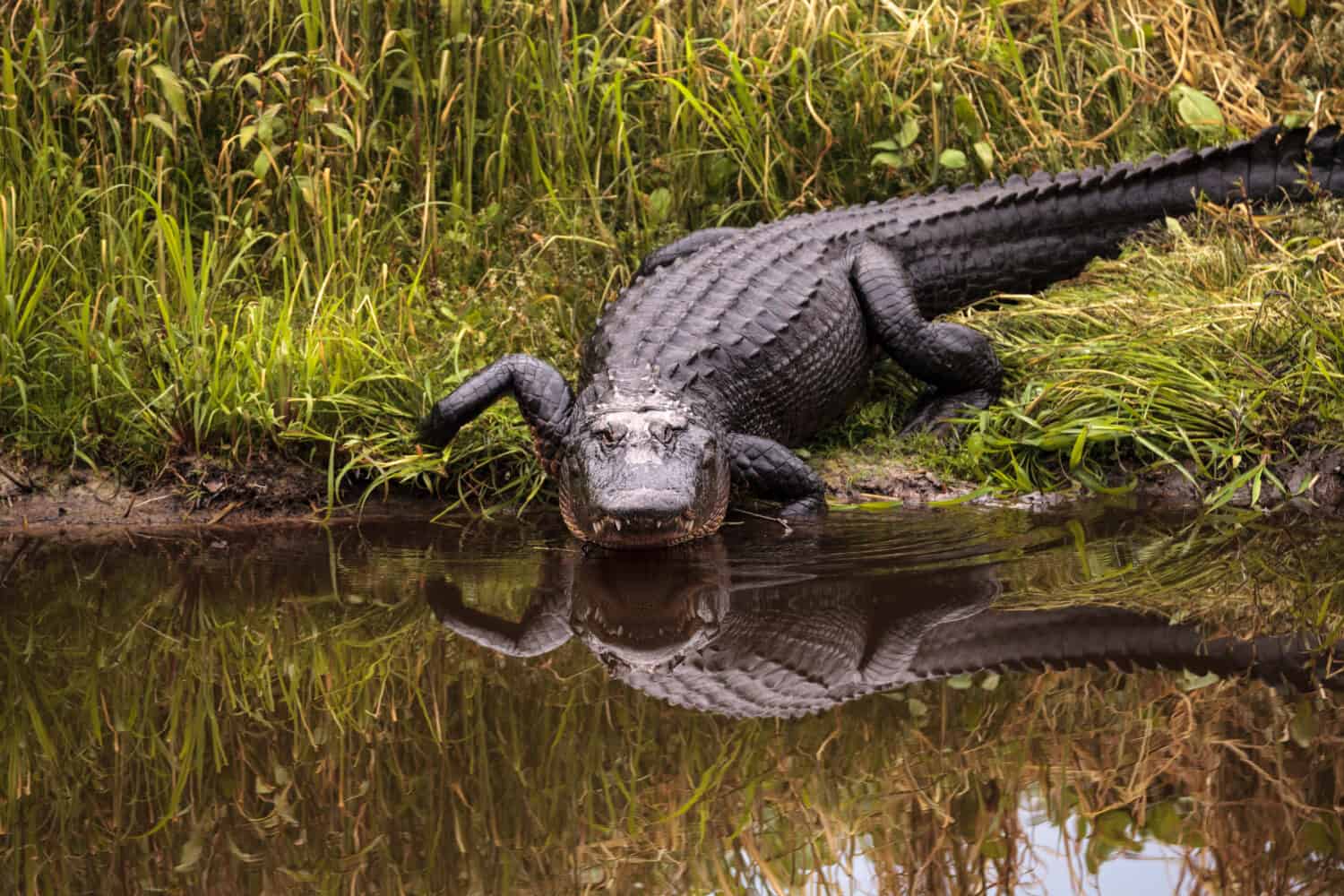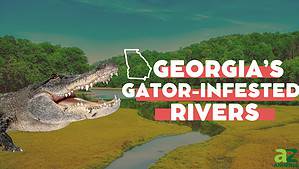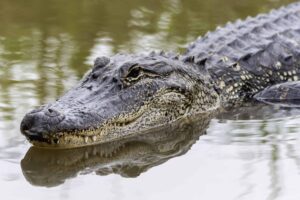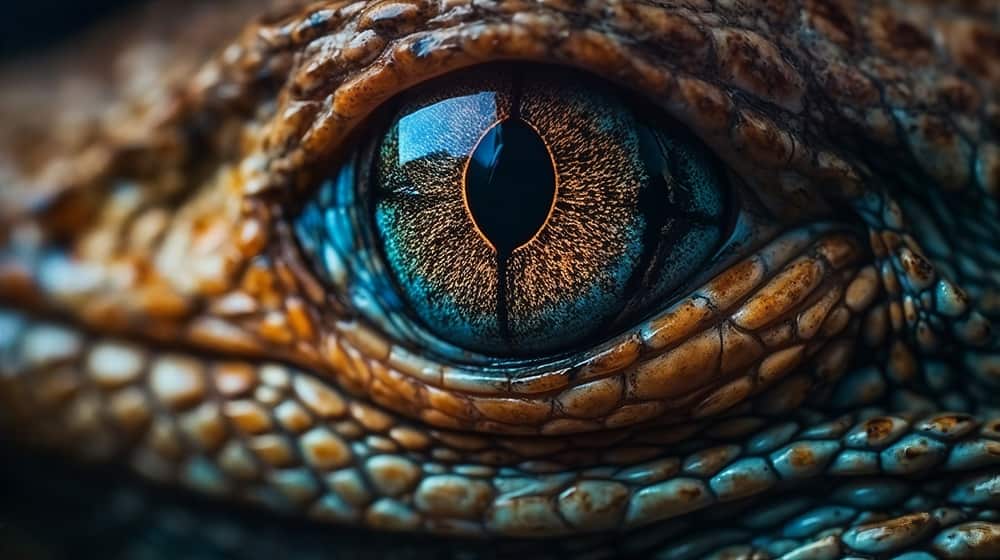
Alligator hunting in Louisiana is a popular sport.
©Ruslan Mussin/Shutterstock.com
Louisiana is one of the several states that offer alligator hunting. Both residents and non-residents can partake in this sport, though it’s decidedly easier for residents. Whether you want to partake in the hunt, or just go along for a ride while someone else does all the work, you’ll need to follow and understand all the rules before you head out alligator hunting in Louisiana.
Hunting Season
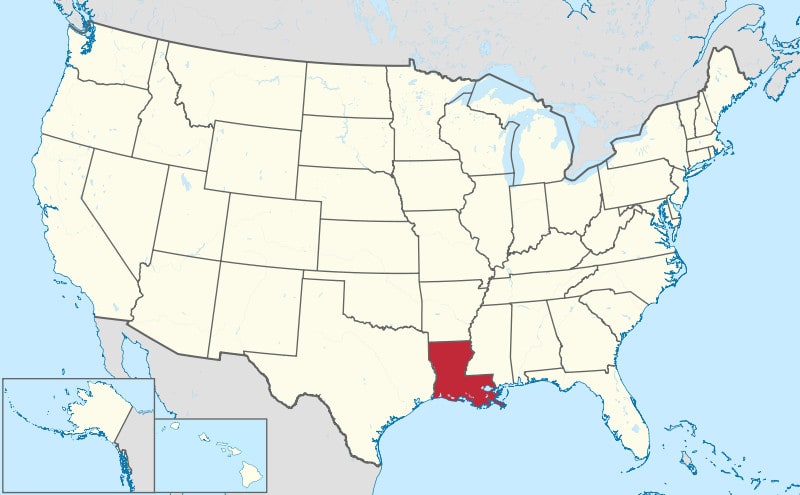
Louisiana is one of the best places for alligator hunting, as they can get quite big in the southernmost areas of the state.
There are two different hunting seasons in Louisiana. The hunting seasons correlate with the two different hunting zones, the East Zone and the West Zone. The East Zone is rather small, taking up a few counties on the easternmost side of the state. Various basins, rivers, and interstates separate the two zones.
The East and West Zones are separated by (listed from north to south) I-55, I-12, I-10, East Atchafalaya Basin Levee Boundary, and Atchafalaya River Boundary.
It includes parts or all of the following Parishes:
- Plaquemines
- St. Bernard
- Orleans
- St. Tammany
- Washington
- Tangipahoa
- Livingston
- East Baton Rouge
- West Baton Rouge
- Iberville
- Ascension
- Assumption
- St. Martin
- St. Mary
- Terrebonne
- Lafourche
- St. James
- St. John
- St. Charles
- Jefferson
- Iberia
The rest of the state’s parishes are part of the West Zone.
In the East Zone, the hunting season starts on the last Wednesday of August. The hunting season in the West Zone starts on the first Wednesday of September. For each zone, the hunting season lasts for 60 days.
Guidelines
Alligator hunting is available for both non-residents and residents. Each one has its own unique rules and guidelines that you must follow.
Residents
Residents of Louisiana can hunt on private land they own and they have permission to hunt from the landowner. They also have the chance to hunt on public lands and lakes, but you must first get access via a bidding or lottery system.
Alligator Hunting License
All residents must have a valid Alligator Hunter License and harvest tags at the time of hunting. The fee to get a Resident Alligator Hunter License is $25. If you’re hunting on private land, that’s the only fee you have to pay. However, if you want to harvest on public lands, depending on the program, the cost of the alligator harvest, and the year, the fees change.
The tags sent out are specific to certain properties. You must use them on the property listed on the hunter’s license. Hunting licenses must be on the hunter when they are hunting an alligator as well as when they have an alligator in their possession or are looking to sell parts.
Helper License
Those who are helping someone with alligator tags catch or hunt an alligator must purchase a Helper License. People with these licenses can hunt individually from the licensed hunter. The Helper License also costs $25 and is only available to residents. The Helper License will have the name and license number of the hunter or hunters they are helping.
Observers and Sport Hunters
Anyone choosing to just watch the hunt doesn’t need a license. However, these people aren’t allowed to actively participate in the pursuit, capture, or killing of the alligator.
There’s also the option for residents to hunt alligators for sport. For this method, you must have a guide. A guide is someone who is a licensed alligator hunter or their helper. Unlike Helper Licenses, an alligator sport hunter must be with their guide at all times. These licenses also cost $25. This is an option for those who don’t have access to private or public lands.
Non-Residents
Non-residents can hunt on any private land they own. Like with resident hunters, you must purchase an Alligator Hunting License and alligator harvest tags before you’re allowed to go hunting.
Like resident hunters, the tags provided are property-specific. They must also be on the hunter at all times when handling an alligator or looking to hunt an alligator.
Alligator Hunting License
Non-residents must still apply for their tags and licenses. While there are no additional fees for hunting on private lands, they must still buy the license. The non-resident hunting license is quite a bit more than the resident one at $150.
Alligator Sport Hunter License
If non-residents don’t own any land, then the only other option for them to hunt in Louisiana is to get an Alligator Sport Hunter License. They must know someone who has either a hunter or helper license in the state.
Sport hunters must always be with a licensed hunter or helper while on the search for alligators. Like with the Alligator Hunting License, the cost is $150.
Private Lands
For private lands, the Louisiana Department of Wildlife and Fisheries (LDWF) provides tags for the owner or someone who has permission from the landowner to hunt on the property. However, not every landowner in Louisiana can get a tag.
The land must have a wetland habitat on it that’s considered capable of sustaining an alligator harvest.
Public Lands
If you don’t have land that’s suitable for alligator harvesting, the other option is to hunt on public lands and lakes. LDWF hands out these tags via bidding or a lottery.
There are roughly 1,245 alligators over 40 wildlife management areas and lakes every year. With an average of 400 residents applying for these tags, there’s plenty to go around.
Bidding Guidelines
Bidding for alligator hunting in Louisiana starts at the end of June. To bid, you must fit the minimum criteria. This includes being a resident of Louisiana and at least 18 years of age before the bidding starts. You must also have previous experience with alligator hunting in Louisiana. The minimum acceptable bid is 40 percent.
Since equipment isn’t provided, you have to be able to bring your own equipment to the area you’re bidding on. You also have to be able to go to the area you bid on every morning until you fill your quota. Unlike other hunting options, you can’t just go on your free days or occasionally through the season.
Some areas will have specific rules, as will LDWF that you must follow. You must ensure you keep up with your records. As part of the application, you will have your background checked and screened for previous wildlife and criminal violations. If you have a felony conviction, littered, or been convicted of Class Two or above wildlife or WMA/USACOE/Refuge violations, you will be disqualified.
For areas where you win a bid, you are not allowed to guide others or take people with a sport alligator hunting permit. You also can’t participate in any reality show or TV production unless specifically approved. You must also take hunting education courses.
Individuals can choose to bid on more than one area, but you will only ever win one. You must rank your choices when submitting the bids. Additionally, there is only one winner per house. You will receive a call from the department if you win your bid. Usually, this bid lasts for three years. So you will be able to harvest on that land for three alligator hunting seasons.
If you don’t meet your quota for the season, you may have to pay LDWF for the loss.
Lottery Guidelines
Lottery applications start in the middle of May every year. All applicants must be Louisiana residents and at least 16 years old. Applicants also need to follow the hunter education requirements.
If the lottery selects you to hunt on public lands, then you must ensure you follow all the rest steps. The first steps are to purchase an Alligator Hunter License and pay the set fee per harvest tag issued. The license is $25 and each alligator tag is $40.
The department will tell you where and when to go and pick up your license and tags as well as any unique instructions you need to know. You’ll also need to sign the Alligator Hunting Agreement.
Generally, you get three tags for the wildlife management area or public lake you have tags for. There are 48 different areas for alligator hunting in Louisiana. The LDWF offers information on how many tags each hunter gets, as well as the chances of getting chosen, and how many tags in total each area has.
Depending on the parish and lake you’re applying for, the issuing date and location for picking up the tags and license are different. In some locations, they start up as early as the first week of August. But some don’t have an issuing date until the last week of the month.
What You Need to Apply for Tags
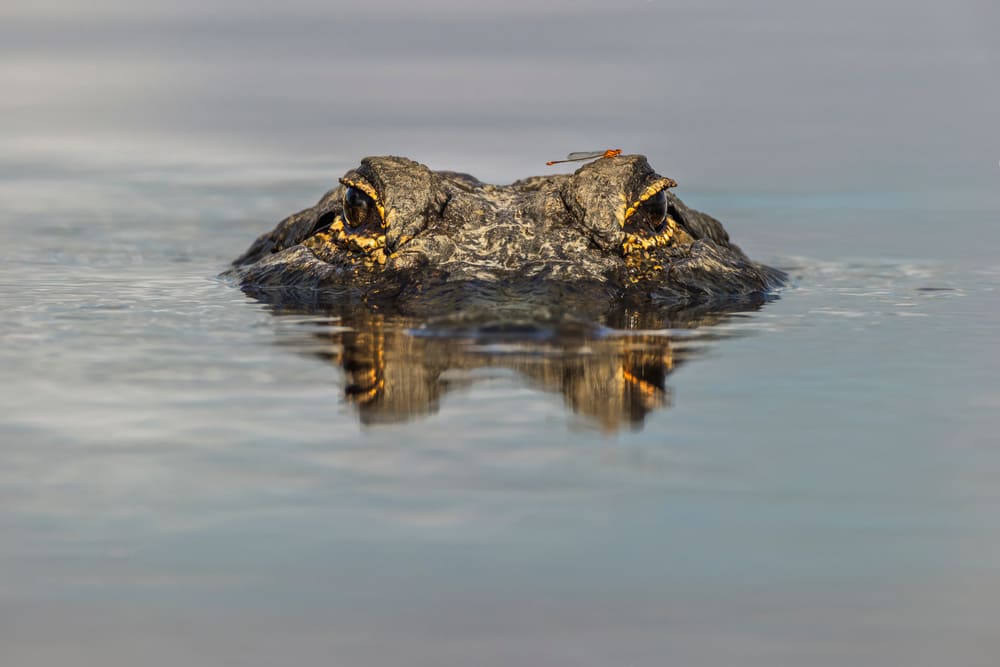
Before you catch one of these beasts when alligator hunting in Louisiana, you need to get the proper tags.
©Danita Delimont/Shutterstock.com
For private lands, you need to complete the alligator hunter license application form. You also need to have proof of property ownership such as tax receipts or a bill of sale.
The property ownership information must include the parish, township, range, section, and acreage of the land. The department also requires a map with the area you want to hunt on the property highlighted. If you aren’t the owner of the property, you will need a signature from the landowner included in all of the information above.
The LDWF will look over the included information and see if it’s in an area the department determines to be suitable for alligator harvesting. If it is, and all the information is accurate, they will send you tags before the season starts.
Rules
There are a couple of over-arching rules that Louisiana has in place for alligator hunting. If you’re hunting on public land, you’ll want to make sure that you obey any specific laws or guidelines put in place as well.
Hunting Hours
It’s illegal to hunt alligators at night. You are only allowed to harvest alligators between sunrise and sunset. You must look up official sunrise and sunset hours, and not just judge it by eye.
Hunting Season
When the hunting season is about to start, you’re allowed to set hooks and lines. However, they can’t be set more than 25 hours before the opening of the season. You also have to remove the hooks and lines by sunset on the last day of the season.
Size Limits
There are no size restrictions on alligators during the open season. Additionally, the quota for alligators depends on the tags you were provided.
Harvesting
There are a variety of methods you can use to harvest. Hooks and lines, bows and arrows, and firearms are all allowed.
Hook and Line
Baited hooks and lines must stay suspended above the water. This is usually done with trees or a pole that helps to suspend the bait. The bait and hook need to stay one to two inches above the surface of the water. There should be at least 30 feet of line. The line must also be at least a 300-pound test.
Lines need checking frequently. If an alligator is caught on a line, you must dispatch immediately. Unless your quota is full, you have to dispatch the alligator. It isn’t legal to release an alligator that gets caught on a hook-and-line trap otherwise.
Once your quota is full, you must remove all hooks and lines as soon as possible.
Bow and Arrow
A bow and arrows attached to a line can be used to capture an alligator. They also work to dispatch alligators.
For catching, barbed arrows must be used. Like with hooks and lines, a 300-pound test line must be attached to the arrow in a way that they won’t separate from each other. The other end of the line has to be attached to something solid and that will stay above water even when the alligator starts to thrash and bull.
Some public lands and lakes ban the use of bows and arrows. So if this is your catch and dispatching method of choice, make sure you do your research before hunting.
Firearms
Firearms are allowed for hunting. Shotguns, however, are not allowed. You can use shotguns for dispatching or killing alligators swimming freely. If you are killing a free-swimming alligator, you must ensure that it’s possible to harvest your alligator after it’s dead and that there is nothing or no one in the way that could be injured from ricochets.
Some public lands and lakes may prohibit the dispatching of free-swimming alligators. Always do your research for public lands and their specific alligator hunting rules if you win a bid or lottery.
What to Do After Harvesting
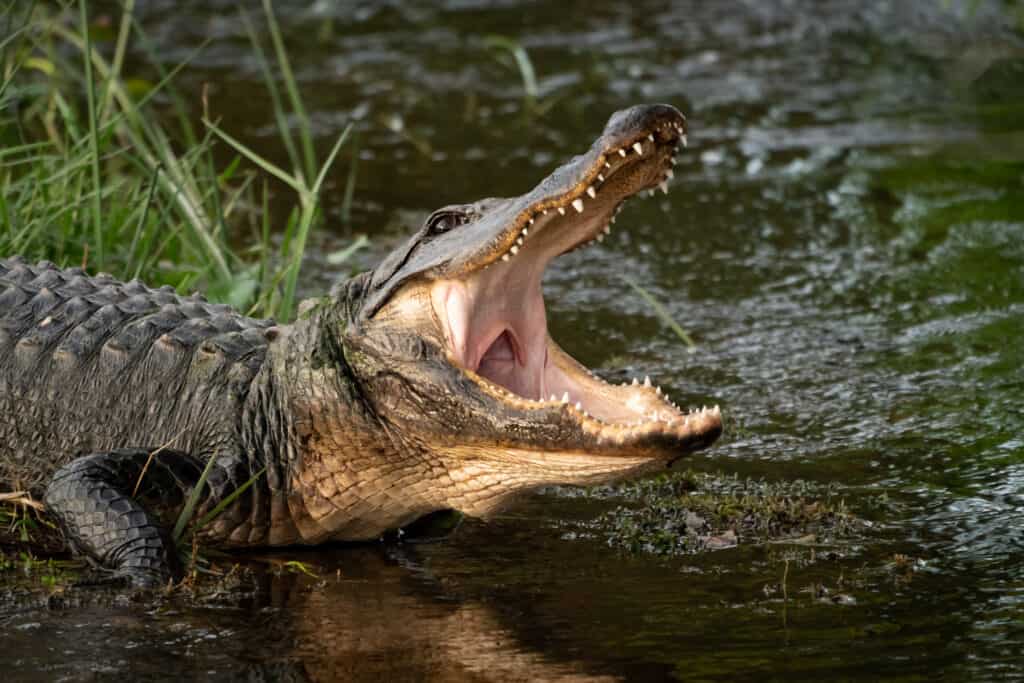
Any standing body of water could house a gator, making swamps, rivers, lakes, and drainage pools all potentially dangerous.
©Deborah Ferrin/Shutterstock.com
Harvested alligators must be tagged immediately before they are moved from where they were harvested. The tag must go right about six inches from the end of the tail and must be placed on the bottom side of the tail.
This tag must stay on your alligator. The only exception is when the hide is being used to make products. It is up to you to take care that you don’t accidentally rip out the tags or break them. You also must be careful to not lose or drop any tags over your boat and into the water.
These tags do not float, and there are no replacements if they are lost.
Leftover Alligator Tags
If you do not use all your tags, you must return them to LDWF within 15 days after the end of the season.
If your tags are lost or stolen, it is the hunter’s responsibility to fill out a lost tag form. This form needs to be submitted to LDWF within 15 days after the season ends. Lost and stolen tags do not get replaced by LDWF.
Notable Exceptions
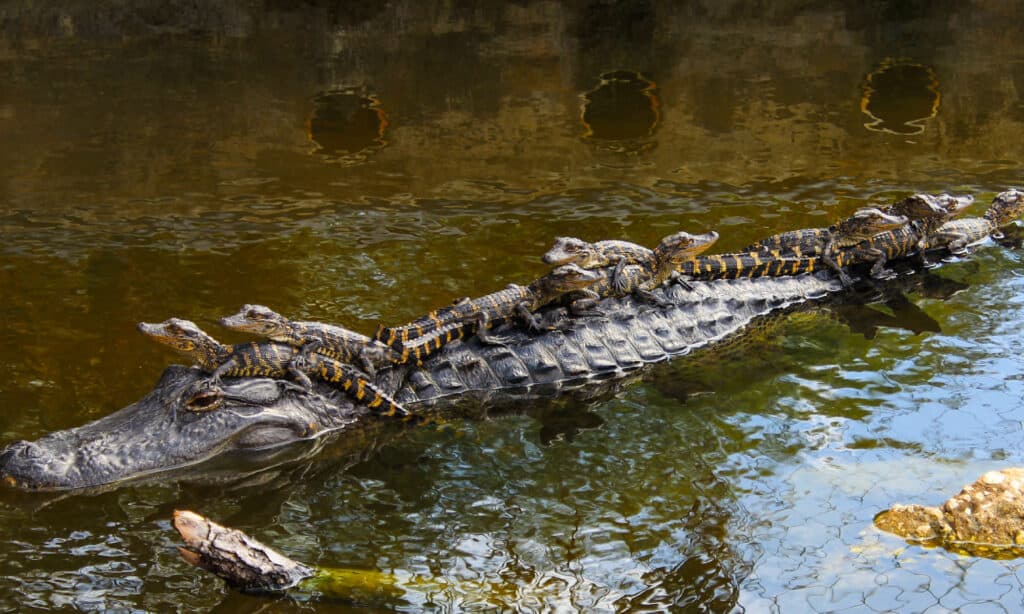
Female alligators are key to keeping alligator hunting in Louisiana alive.
©Marc Pletcher/Shutterstock.com
There are a few areas where the basic rules do not apply, or where additional rules come into play.
Research Alligators
Some alligators are marked for research. The marking usually appears in the form of having a few notches cut out of the tail scutes and metal tags in the webbing between their toes, usually on the back feet.
If you catch one of these research alligators, you must record the tag number, the number of tail notches, the sex of the alligator, and its length. This information but be recorded on the alligator report form and submitted to the Louisiana Department of Wildlife and Fisheries.
Alligator Eggs
It’s also possible to harvest alligator eggs from the wild. It’s an open season that lasts from May 15th to September 1st every year. Gathering alligator eggs outside of this range is a Class Four violation.
The locations you’re allowed to hunt for the eggs will be determined by the biology staff, as well as the number of eggs you’re allowed to collect.
Like with alligator hunting, the tags you are provided are only for one area. To collect eggs outside of that area is illegal. You must also have all of your paperwork and permits on you at the time of harvesting.
Alligator eggs have to be collected during the day, and you can only collect the maximum number on your permit. However, if you aren’t able to hatch at least 70 percent of the eggs you collect, it’s considered a waste of Louisiana’s natural resources. You may lose the chance to hunt for eggs again in the future if this happens multiple years in a row. Hatchling survival must be at least 85 percent.
Once the alligators are at a good age, you must release them back into the wild. Around 78 percent of the hatchlings have to return to the wild. Most of them must measure 48 inches in length when they go back to the wild. The range of their lengths needs to be between 36 and 60 total inches. Finally, at least 50 percent of those released need to be females.
Nuisance Control Hunters
If an alligator is a nuisance, the LDWF may issue a nuisance tag to allow hunting of the gator. This control can happen at any time of the year, as long as it is first prescribed by the department. Often, the landowners themselves get the nuisance tag from the department.
You must still follow the standard rules for alligator hunting, including the method by which you kill it. It’s illegal to capture them or sell them to an alligator farm. The tags are usually free.
Farm Alligators
It’s legal to collect farm alligators at any point in the year. First, however, you have to get hide tags from the LDWF.
Thank you for reading! Have some feedback for us? Contact the AZ Animals editorial team.

